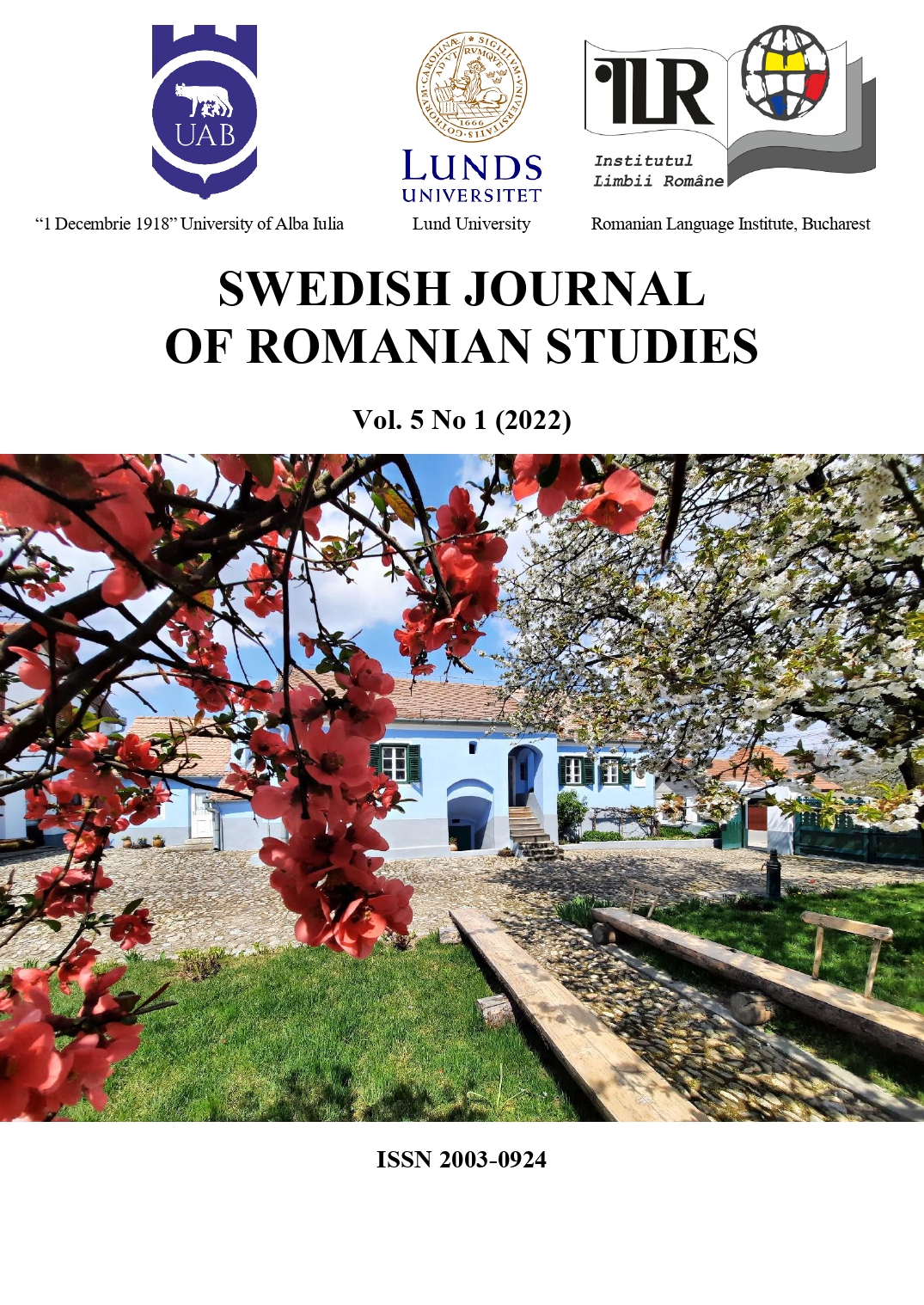Arta sofismului. Retorică, discurs, simulare și profeții în Însemnările zilnice ale lui Carol al II-lea
The art of sophistry. Rhetoric, discourse and prophecies in Carol II’s Însemnări zilnice (Daily Notes)
DOI:
https://doi.org/10.35824/sjrs.v5i1.23920Keywords:
rhetoric, oratory, stylistics, Carol II of Romania, politicsAbstract
The diary of the Romanian king Carol II, Însemnări zilnice (Daily Notes), may seem sketchy, but it is loaded with significant deeds and details. Additionally, it is stylistically marked from the point of view of omissions, allusions, and dissimulations. The epoch was one of complex historical background and the author made use of various, even if diminished, rhetoric figures. Rhetoric, oratory, and stylistics play many roles in the autobiographical pact. Carol II made use of them în a scarce manner precisely with the purpose of increasing the authenticity and sincerity of his discourse. On the other hand, many entries in the diary are hasty, but they strive to glorify or justify the king and his entourage. We sooner than later identify a macrorhetoric intended to delineate, on the one hand, a sophistic royal potrait and to decipher and characterize people belonging to the high society, on the other hand, a strategy to tackle with a tumultuous decade.
References
Carol al II-lea, Regele României. Însemnări zilnice. 1937-1951. (1995)/ Carol II, King of Romania. Daily Notes, 1937-1951. Volumul I, 11 martie 1937-4 septembrie 1938 (Caietele 1-6). București: Editura Scripta.
Carol al II-lea, Regele României. Însemnări zilnice. 1937-1951. (1997)./ Carol II, King of Romania. Daily Notes, 1937-1951 Volumul II, 13 martie-15 decembrie 1939 (Caietele 8-10). București: Editura Scripta.
Carol al II-lea, Regele României. Însemnări zilnice (1998)/ Carol II, King of Romania. Daily Notes. Vol.III. București: Editura Scripta.
Cattani, A. (2003). ”Las reglas del diálogo y los movimientos de la polémica”. În Quadernos de Filosofia i Ciencia, no. 32-33. 7-20.
Călinescu, A. (1990). Însemnări politice 1916-1939/ Political Notes 1916-1939, București: Editura Humanitas.
Cervantes, G., del Mar, M. (2007). ”El zigzagueante y dilatado recorrido de la Retórica: un acercamiento a su cambiante valoración”. În Interlinguistica, ISSN 1134-8941, no 17. 419-428.
Coteanu, I. (1993). Gramatica de bază a limbii române/ The Fundamental Grammar of the Romanian Language. București: Editura Albatros.
Cuvântările Regelui Carol II, 1930-1940/ King Carol II’s Speeches. (1940) vol. I. București: Fundația Regală pentru Literatură și Artă. 305-306.
Eire, A.L., Guervós, J. de S. (2000). Retórica y comunicación pólitica. Madrid: Cátedra.
Eire, A.L. (1995). ”Amado Alonso, más allá de la estilística”. În Humanitas, Universidad de Salamanca, volumen XLVII.
Petrescu D. „Fundația Culturală Regală «Principele Carol» (1921-1940)”/ ”The Royal Cultural Foundation ‘Prince Carol’(1921-1940)”. În Carpica, XXIX. 271-276.
Popescu, T. (1963). Istoria Partidului Național, Țărănist și Național-Țărănist/ History of the National, Peasants’ and National-Peasants’ Party. Madrid: Editura Carpați.
Reboul, O. (1984). Le language de l’éducation, Paris: PUF.
Rosen, M. (1990). Primejdii, încercări, miracole/ Dangers, tests, miracles. București: Editura Hasefer.
Downloads
Published
How to Cite
Issue
Section
License
Copyright (c) 2022 Felix Narcis Nicolau

This work is licensed under a Creative Commons Attribution-NonCommercial 4.0 International License.
Authors who publish with this journal agree to the following terms:
a. Authors retain copyright and grant the journal right of first publication with the work simultaneously licensed under a Creative Commons Attribution-NonCommercial 4.0 International License that allows others to share the work with an acknowledgement of the work's authorship and initial publication in this journal.
b. Authors are able to enter into separate, additional contractual arrangements for the non-exclusive distribution of the journal's published version of the work (e.g., post it to an institutional repository or publish it in a book), with an acknowledgement of its initial publication in this journal.
c. Authors are permitted and encouraged to post their work online (e.g., in institutional repositories or on their website) prior to and during the submission process, as it can lead to productive exchanges, as well as earlier and greater citation of published work (See The Effect of Open Access).

